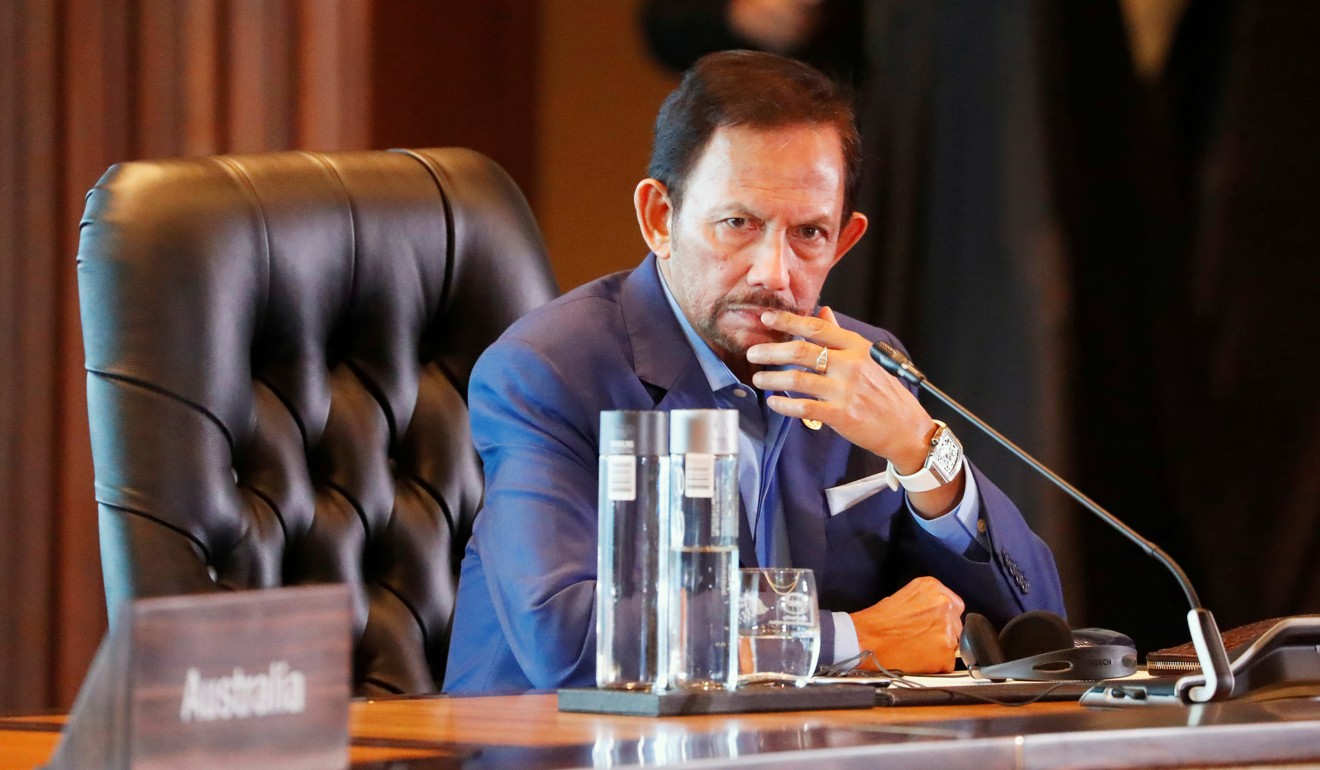
Being gay in Brunei: how a travel ban and sharia law upended activist’s life
- Aziq Azman has not been able to travel for the past two years after authorities put him on a blacklist for drinking alcohol and insulting the Sultan
- He said the harsher punishments are ‘like a magic act’…, covering up more insidious human rights violations in the oil-rich nation
Bruneian activist and writer Aziq Azman has not been able to leave his homeland for the past two years. It is not by choice – soon after the 25-year-old Muslim was caught at Bandar Seri Begawan airport with two bottles of undeclared wine in his suitcase in May 2017, religious authorities put him on a travel blacklist.
The inability to travel has cost him his job as a business reporter, Aziq said.
Gays face death by stoning in Brunei, the ‘Saudi of Southeast Asia’. Really?
“I feel trapped. My employers recently found out that I was banned from travelling and let me go, because they didn’t want to attract negative attention of religious authorities.”
Aziq’s experience, activists say, shows how Brunei’s laws have long circumscribed human rights, even before 2013, when authorities announced they would introduce more extensive sharia laws.
Aziq, who is gay, said the penal code punishments are “like a magic act”, covering up more insidious infringements of human rights that Brunei’s 430,000 citizens are already subject to.
“These punishments are not the human rights violations to be concerned about. They’re a flashy distraction when the real truth is behind the curtain: laws violating freedom of speech, taking away freedom of movement, being denied proper legal defence in a complex sharia system,” said Aziq, who had been told he would not need a lawyer.
Like many former British colonies, Brunei has sedition laws that outlaw dissent against those in power and criminalises criticism of the royal family, especially the Sultan. Those who want to question the absolute power of the monarch have taken to anonymous posts on forums like Reddit.
Brunei anti-gay law: why Asian activists don’t need ‘saviours’ like Clooney
Homosexual sex has always been illegal, so “if you’re gay, you can’t express that, you can’t talk about it unless you are somehow above the law,” said an activist from advocacy group The Brunei Project, who asked that his real name not be used for fear of backlash from the authorities.
Limits to the freedom of speech have also affected the media. The Brunei Project activist said state media had become more “religiously correct” over time, and were unable to question the governing philosophy of ‘Malay Islamic monarchy’. Bruneian journalists have privately spoken of sackable offences, such as placing photos of royal family members in the wrong order of hierarchy.
In a 2019 report, watchdog Freedom House ranked Brunei 29 out of 100 for political rights and civil liberties, warning of an “informant system” that monitored suspected dissidents.

LGBT activist Jean Chong of Singapore NGO Sayoni said those already disenfranchised are most affected by laws that promote self-censorship.
“These laws drive fear among the general population, what more for minorities who are discriminated against with little legal protection or living under laws that actually stigmatise and criminalise them.”
Brunei watcher Mustafa Izzuddin of Singapore’s Institute of South Asian Studies, said there was a yearning among the younger generation for “greater openness and accountability”, as well as the freedom to express alternative views.
But for Aziq, Brunei cannot improve if the authorities continue perceiving any form of criticism as an uprising against those in power.
In 2015, an old comment he left on a YouTube video about the hotel boycotts questioning why the royal family was immune from prosecution went viral, earning him death threats from the public.
LGBT residents struggle with dating and religion amid death by stoning law
When he was found with wine in his suitcase years later, despite paying a fine of BND500 (US$370) to customs authorities, religious affairs authorities brought up his old YouTube comment and said they would take him to court.
He was accused of contempt of sharia justice for drinking alcohol and insulting the Sultan, facing an eight-year sentence. But a judge ruled he could settle the matter out of court if he underwent weeks of religious counselling.
He faithfully turned up for his sessions, chatting at length with the counsellors “mostly because I didn’t want to listen to their brainwashing”. But since completing the counselling course in 2017, he has still not been able to use his passport and is in touch with the authorities to seek a solution.

Attempts by the Post to contact Brunei’s Religious Affairs Ministry went unanswered.
“To add insult to injury, I was told by the religious authorities to ‘have patience and trust in God’. I don’t have the words to fully express how much anguish, pain and anger the authorities have caused.”
Aziq is seeking therapy for the mental health issues he is grappling with as a result of the ban. Living off a severance package, which will only sustain him until August, he must now find work in a country struggling with an unemployment rate of 9.3 per cent.
“All the authorities say when I call is that they have raised the case to the relevant parties and will inform me when they hear back,” says Aziq.
“Not having the personal freedom to travel has broken me to the point where I am disgusted with myself, I feel like I am no longer a person but a piece of property, owned by and at the mercy of a system that I have lost all faith in. A country is supposed to protect its people.”

